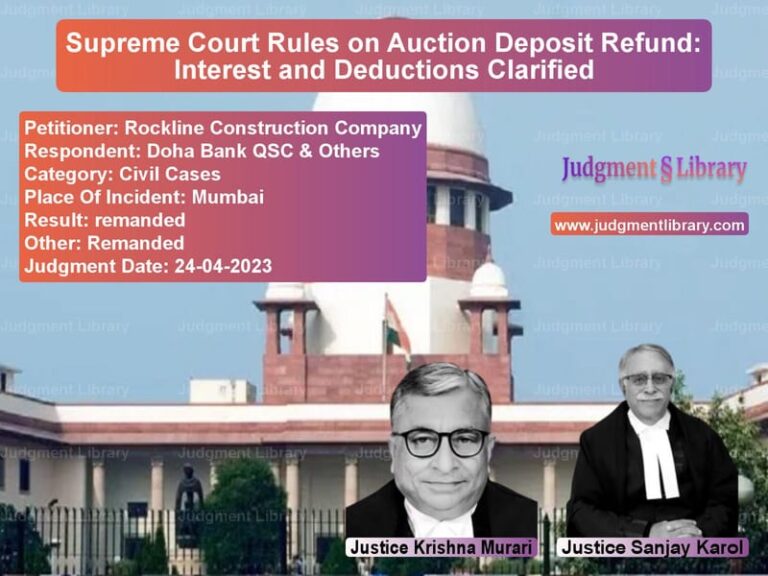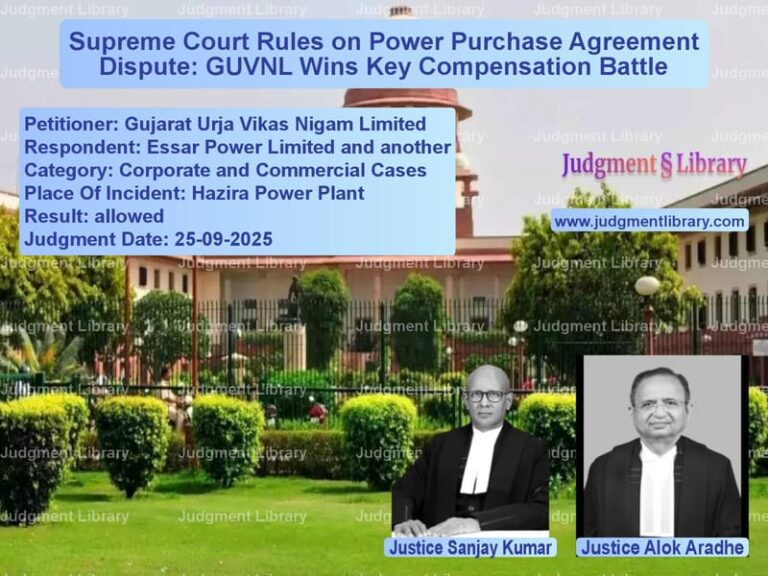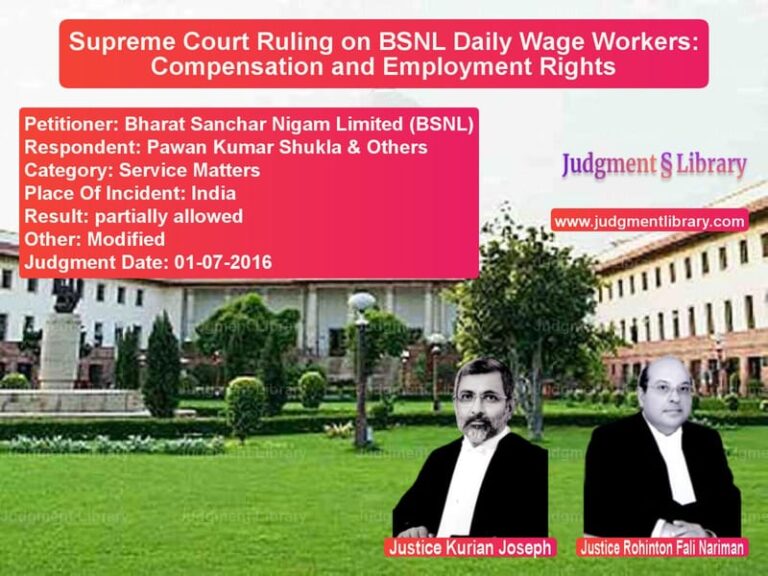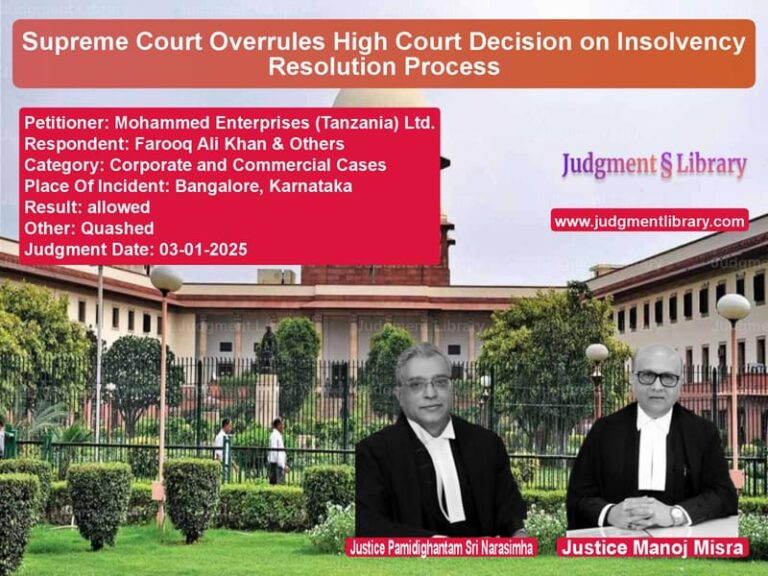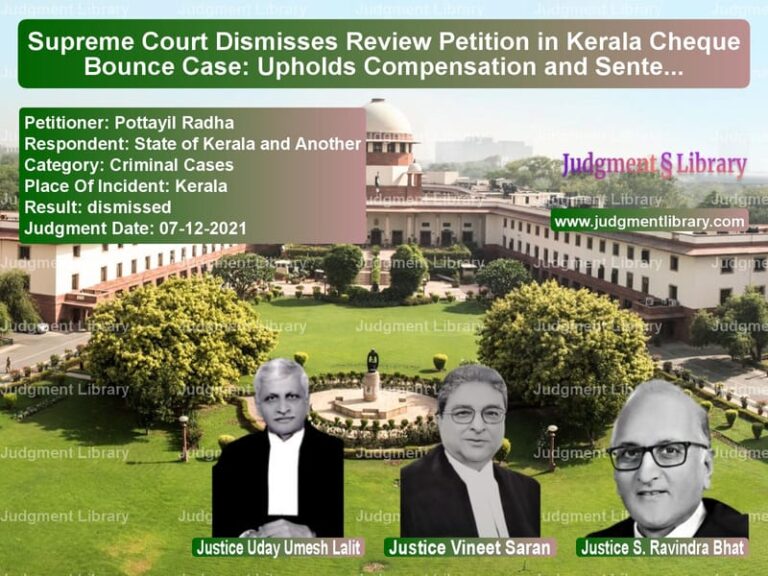Army Personnel Posting Dispute: Supreme Court Dismisses Petition Challenging Transfer Orders
The case of Maj. Amod Kumar vs. Union of India & Anr. deals with a legal challenge to the posting of Army Service Corps (ASC) personnel to operational areas. The Supreme Court had to determine whether the postings violated fundamental rights and whether the affected personnel had the right to refuse such transfers. The petitioners argued that ASC personnel were classified as ‘non-operational’ and should not be deployed to combat zones, while the government maintained that all army personnel, except medical personnel, were subject to operational postings.
Background of the Case
The petitioners were Army personnel from the ASC, including officers and a sepoy, who challenged their posting to operational units. The petitioners claimed that their service conditions did not require them to serve in operational roles and that the government’s actions contradicted previous judicial rulings.
The main grievances of the petitioners revolved around their classification as ‘non-operational’ personnel for promotions while being treated as ‘operational’ personnel for postings. They alleged this was unfair and discriminatory.
Arguments by the Petitioners
- The petitioners argued that their postings violated their fundamental rights under Articles 14 and 21 of the Constitution.
- They relied on the judgment in Lt. Col. P.K. Choudhary & Ors. vs. Union of India, where ASC personnel were classified as ‘non-operational’ for promotional purposes.
- They contended that if they were considered ‘non-operational’ for promotion, they should also be treated similarly for postings.
- The posting orders to operational areas were unjust, as they subjected ASC personnel to risks similar to those faced by combat arms personnel without offering them equal promotional avenues.
- They argued that ASC personnel primarily handled logistics, vehicle maintenance, and supplies, which did not justify their placement in combat roles.
Arguments by the Respondents (Union of India)
- The government argued that the petitioners’ claims were baseless and that the Army did not have any ‘non-operational’ personnel except for medical staff, who had a special status under international law.
- Posting and transfer orders were an essential condition of service, and military personnel could not claim a fundamental right to a particular posting.
- The decision in Lt. Col. P.K. Choudhary applied only to promotions and had no bearing on postings.
- All personnel, including those in the ASC, had an ‘operational’ role and were expected to serve in active units.
- The petitioners had not alleged any malice or bias in their postings, which made their claim legally unsustainable.
Supreme Court’s Observations
The Supreme Court examined whether the postings violated any statutory rules or fundamental rights. The Court made several key observations:
- Army postings are a matter of internal administration: The Court held that matters related to military transfers should be left to the discretion of the armed forces.
- Scope of judicial review in military matters is limited: The Court cited its earlier ruling in Major General J.K. Bansal vs. Union of India, which held that military transfers should not be interfered with unless there is clear evidence of malice or legal violations.
- Personnel must serve wherever ordered: The Court noted that military personnel take an oath to serve wherever ordered, and refusing to follow transfer orders would undermine discipline.
- The petitioners failed to prove a violation of fundamental rights: The Court found that the petitioners had not demonstrated how their postings infringed upon their constitutional rights.
- No statutory violation was established: The Court emphasized that the petitioners had not cited any rule or policy that prohibited their posting to operational areas.
Key Judgment Excerpts
The Supreme Court upheld the government’s authority in managing postings and stated:
“The Army has no personnel who are ‘non-combatants’ or ‘non-operational’, with the exception of medical personnel who have a distinct status under International Humanitarian Law. The Combat Arms, Combat Support Arms, Army Service Corps, and other Minor Corps are all ‘operational’ entities having a distinct operational role.”
The Court also reiterated that:
“The scope of interference by the courts in regard to members of the armed forces is far more limited and narrow. It is for the higher authorities to decide when and where a member of the armed forces should be posted. The courts should be extremely slow in interfering with an order of transfer of such category of persons and unless an exceptionally strong case is made out, no interference should be made.”
Final Judgment
- The Supreme Court dismissed the writ petitions, ruling that the petitioners’ claims had no legal merit.
- The Court found that the postings were lawful and did not violate any fundamental rights.
- The judgment reaffirmed that military personnel must comply with transfer orders and cannot challenge them on personal grounds.
- The Court also noted that the proper forum for such grievances was the Armed Forces Tribunal, not the Supreme Court under Article 32.
Conclusion
This ruling upholds the military’s authority in determining postings and transfers. It underscores that judicial interference in military administration is limited and that personnel must serve wherever ordered. The Supreme Court’s decision reinforces the principle that postings are an essential part of military service and cannot be challenged except in exceptional circumstances involving malice or statutory violations.
Petitioner Name: Maj. Amod Kumar.Respondent Name: Union of India & Anr..Judgment By: Justice R.F. Nariman, Justice Indu Malhotra.Place Of Incident: India.Judgment Date: 06-09-2018.
Don’t miss out on the full details! Download the complete judgment in PDF format below and gain valuable insights instantly!
Download Judgment: Maj. Amod Kumar vs Union of India & Anr Supreme Court of India Judgment Dated 06-09-2018.pdf
Direct Downlaod Judgment: Direct downlaod this Judgment
See all petitions in Transfers Cases
See all petitions in Public Sector Employees
See all petitions in Disciplinary Proceedings
See all petitions in Judgment by Rohinton Fali Nariman
See all petitions in Judgment by Indu Malhotra
See all petitions in dismissed
See all petitions in supreme court of India judgments September 2018
See all petitions in 2018 judgments
See all posts in Service Matters Category
See all allowed petitions in Service Matters Category
See all Dismissed petitions in Service Matters Category
See all partially allowed petitions in Service Matters Category


